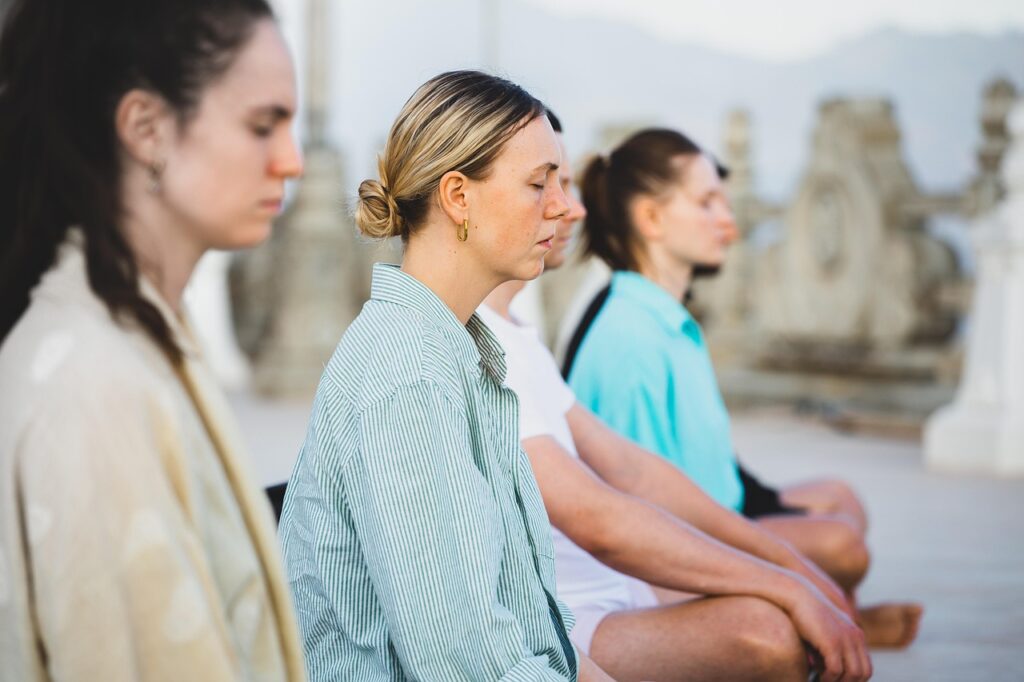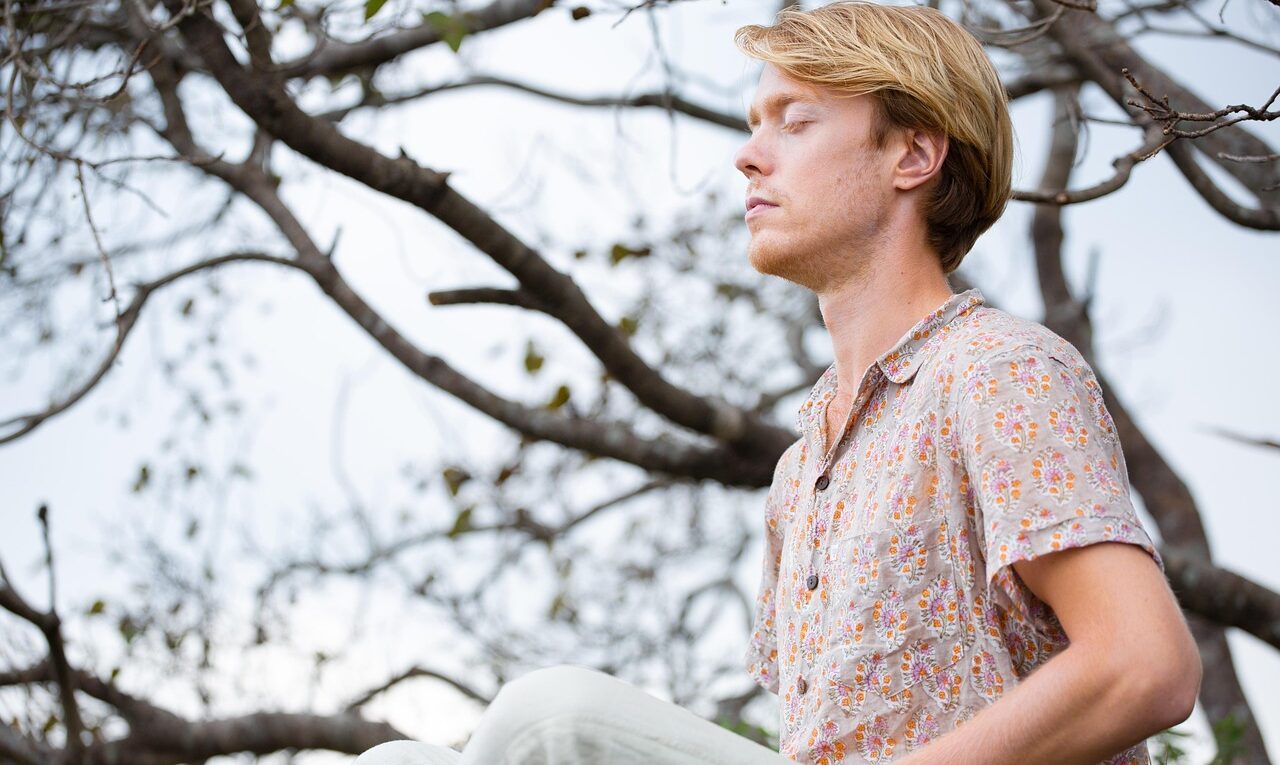How to Build a Daily Ritual That Grounds You and Transforms Your Life
How to Build a Daily Ritual That Grounds You and Transforms Your Life
Discover how to build a daily ritual that grounds you, restores balance, and creates inner calm through mindful, intentional practices.
Read Disclaimer
There’s something quietly sacred about rituals. They’re not just routines or habits, not simply the brushing of teeth or checking your phone when you wake up. Rituals carry meaning, intention, and a certain rhythm that grounds you when life feels unsteady. In a world where days blur together, where mornings dissolve into evenings filled with busyness and noise, having something that anchors you can make all the difference. A ritual, unlike a mechanical task, is infused with awareness and a sense of purpose. It can be simple, like lighting a candle, or elaborate, like a morning yoga practice followed by journaling and tea. But no matter the form, it can give your life a deeper sense of rhythm, steadiness, and calm.
Most of us crave grounding without even realizing it. We might say we’re tired, stressed, overwhelmed, or anxious, but beneath those words often lies the need for stability, for something that helps us remember who we are when the world pulls us in all directions. When you create a daily ritual, you carve out a pocket of time in which the noise quiets down and the pace slows. You give yourself permission to exist as you are, not as the world expects you to be. And in that act of presence, healing begins.

It’s worth noting that building a ritual doesn’t require perfection, nor does it mean every day will look the same. Life is unpredictable, and there will be mornings when you oversleep, nights when you’re too drained, or days when your routine is disrupted. A ritual is not about rigidity; it’s about creating a touchstone, a small act or series of acts that can be returned to whenever possible. Think of it less as a checklist and more as a conversation with yourself. The way you show up for it matters more than how perfect it looks.
The first step in crafting a ritual that grounds you is understanding your own rhythms. Some people thrive on mornings, finding that the early hours are when their minds are clearest and hearts most open. For others, evenings bring a sense of reflection and calm, making nighttime rituals more natural. Pay attention to when you feel most in need of grounding. Is it at the start of the day before responsibilities pile on? Or at night, when your mind refuses to quiet down? This self-awareness forms the foundation of your practice.
Science backs up what many spiritual and cultural traditions have known for centuries: rituals help regulate our nervous system. Studies show that intentional practices, even small ones, reduce cortisol levels, ease anxiety, and increase a sense of control. When we repeat certain actions with meaning, our brains begin to associate them with safety and stability. That’s why lighting incense or listening to calming music can instantly soothe us—it tells the body, “You’re safe now.” Rituals provide predictability in a world that often feels chaotic, and that predictability calms the body.

Practicality also matters. A ritual doesn’t have to be extravagant to be effective. Many people assume they need an hour-long routine filled with meditation, journaling, exercise, affirmations, and reading. But the truth is, a ritual can be as brief as three minutes. The key is consistency and intention. Imagine pausing every morning to take three deep breaths while you focus on gratitude, or ending every evening by writing down one thing that went well that day. These acts might seem small, but practiced over time, they root you into a rhythm of reflection and connection with yourself.
The beauty of rituals is that they can be tailored to your personality, values, and needs. For the spiritually inclined, it may be prayer, chanting, or lighting a diya or candle. For the creative soul, it could be sketching for ten minutes before work. For someone with a restless mind, mindful breathing or stretching might bring the most peace. For another, savoring a cup of tea in silence could be the grounding force. The form matters less than the intention behind it. A ritual is your reminder that you belong to yourself before you belong to the demands of the world.
Think of the symbolic power embedded in rituals throughout human history. Communities have long marked transitions—births, deaths, harvests, seasons, marriages—with ceremonies. Why? Because rituals help us process life’s chaos and give it meaning. On an individual level, your daily ritual can do the same. It marks the beginning or end of your day, signaling to your mind and body: this is your sacred time. You don’t have to belong to a particular culture or religion to benefit from this; the act of creating intentional space is universal.

Of course, the challenge often lies not in knowing what to do, but in actually committing to it. We live in an age of distractions, where our phones compete for attention from the moment we wake up until we fall asleep. To protect your ritual, you must treat it as non-negotiable, a meeting with yourself as important as any appointment in your calendar. Start small, with something achievable, so it doesn’t feel like a burden. Over time, your ritual will become second nature, and you’ll notice that you crave it, much like your body craves food or water.
Rituals are not just about self-soothing—they’re about alignment. They help align your actions with your deeper values. If you value mindfulness, your ritual may involve meditation. If you value creativity, it may involve writing. If you value connection, maybe your ritual is calling a loved one each evening to share gratitude. When you intentionally design your ritual to reflect your values, you’re not just grounding yourself; you’re living in harmony with what matters most.
There will also be days when your ritual feels less powerful or when you move through it mechanically. That’s normal. Just as with meditation, some days feel profound, while others feel ordinary. Don’t judge the experience. The grounding doesn’t always happen in the moment—it accumulates quietly over time, like drops of water filling a vessel. The consistency itself is what weaves the benefits into your being.
Consider how grounding rituals can influence your relationships, work, and mental health. When you begin the day rooted in calm, you’re less likely to carry stress into your interactions. When you end the day with reflection, you sleep with more peace. Over time, these small changes create a ripple effect. Your presence deepens, your resilience strengthens, and you cultivate a quiet inner strength that others can feel. In this way, your ritual is not only a gift to yourself, but also to the people around you.

If you’ve ever felt unworthy of taking time for yourself, let this be your reminder: you are allowed to pause. You are allowed to create moments that nourish your spirit. In fact, you need them. Rest, ritual, and reflection are not luxuries reserved for a few; they are necessities for a grounded and meaningful life. By building a ritual that resonates with you, you affirm that your well-being matters, that your inner life is worth tending to, and that amidst the chaos of the world, you can always find your way back to center.
When you start living with rituals, you might notice subtle shifts. The morning doesn’t feel as rushed. The evening feels softer. The in-between moments feel more manageable. Life won’t stop being unpredictable, but you’ll stop being so easily swept away by it. Because each day, you’ll have that anchor, that touchstone, that small yet powerful act that reminds you: you are here, you are steady, and you are enough.
And perhaps the most profound truth of all is that in creating rituals, you’re also creating meaning. You’re telling your story through small, repeated acts. You’re marking your days not just by what you did for others, but by how you showed up for yourself. That, in itself, is grounding. That, in itself, is life-changing.
So, as you reflect tonight or wake tomorrow, ask yourself: what is one small ritual I can create to ground me? And then, begin.
FAQs with Answers
- What is a daily ritual?
A daily ritual is a set of intentional practices or actions done consistently that bring a sense of grounding, meaning, and stability to your life. - How is a ritual different from a routine?
A routine is often automatic and task-oriented, while a ritual carries mindfulness, emotional presence, and deeper purpose. - Why are daily rituals important for mental health?
They provide structure, reduce stress, and help regulate the nervous system, making you feel calmer and more resilient. - Can daily rituals reduce anxiety?
Yes, consistent rituals can calm the mind, lower cortisol levels, and provide a sense of safety and predictability. - How long should a daily ritual take?
It can be as short as 3 minutes or as long as an hour. What matters most is consistency and intention, not length. - What are examples of simple daily rituals?
Deep breathing, journaling, gratitude practice, drinking tea mindfully, lighting a candle, or stretching. - Do rituals have scientific benefits?
Yes, studies show rituals reduce stress hormones, improve focus, and enhance emotional regulation. - Can rituals improve sleep?
Evening rituals, such as reading, writing reflections, or meditating, help prepare the mind for restful sleep. - How do I start building a ritual?
Begin with one simple act you enjoy and repeat it daily with intention, gradually expanding if you wish. - Do I need spiritual beliefs to practice rituals?
No, rituals can be secular and personal. They are about grounding and self-connection, not necessarily religion. - Can rituals boost productivity?
Yes, grounding rituals clear mental clutter and help you approach tasks with greater focus and energy. - What morning rituals are most effective?
Meditation, gratitude journaling, mindful tea or coffee, stretching, and affirmations are powerful morning practices. - How do rituals help with emotional balance?
They create moments of stillness, reflection, and self-awareness that allow emotions to be processed more gently. - Can rituals be done in the evening instead of the morning?
Absolutely. Evening rituals are excellent for winding down and releasing stress from the day. - How can busy people fit rituals into their schedule?
Even brief rituals—like three deep breaths or a quick gratitude note—can bring grounding without taking much time. - Are rituals the same as habits?
No. Habits are repetitive behaviors, while rituals involve mindfulness, symbolism, and emotional engagement. - Can rituals help with burnout?
Yes, by carving out intentional moments of rest and reflection, rituals help restore energy and prevent burnout. - What is the psychological effect of rituals?
They create predictability, reduce uncertainty, and increase feelings of safety and control in daily life. - Can families practice rituals together?
Yes, family rituals like shared meals, gratitude circles, or storytelling create connection and grounding for everyone. - What role do rituals play in different cultures?
Throughout history, rituals have marked transitions, seasons, and healing, offering meaning and stability. - Can rituals improve self-awareness?
Yes, by regularly pausing for reflection, you become more aware of your thoughts, emotions, and values. - Is journaling a good daily ritual?
Journaling is an excellent ritual that encourages reflection, emotional processing, and creative expression. - Do I need the same ritual every day?
Consistency helps, but flexibility is also important. Adapt your ritual to your needs while keeping the intention intact. - Can rituals help reduce overthinking?
Yes, rituals calm the nervous system and give the mind a healthy focal point, reducing mental spirals. - What are grounding rituals?
Grounding rituals are practices like meditation, mindful walking, or deep breathing that bring you into the present moment. - Can rituals support healing from trauma?
Yes, rituals can provide structure, safety, and self-soothing practices that aid emotional recovery. - What is the best way to stay consistent with rituals?
Treat them as non-negotiable appointments with yourself and start small so they feel achievable. - Can digital detox be a ritual?
Yes, setting aside time daily to disconnect from devices can be a powerful grounding ritual. - Can rituals be creative?
Definitely. Drawing, singing, dancing, or writing poems can all serve as meaningful daily rituals. - What is the ultimate purpose of a daily ritual?
The purpose is to reconnect with yourself, cultivate inner calm, and live each day with presence and intention.

Having a blast with fun88bong88! Great selection of games and always something new to try. The promotions are also a nice bonus. Check it out, you won’t regret it! fun88bong88
online casinos that accept paypal
References:
fightdynasty.com
online casino mit paypal
References:
guateempleos.com
New to 5nnbet, let’s see if I can find some good odds and make some easy money. Never tried this before! Who knows! Check it out here: 5nnbet
us online casinos that accept paypal
References:
ajira-hr.com
online casino for us players paypal
References:
africa.careers
References:
Before and after test cyp 500 week and anavar
References:
https://web.ggather.com/juicenerve91/
FutureProspectsPro – Structured and clear, identifying long-term prospects is quick.
As someone who’s played every car game under the sun, Blocky Car’s minimalist approach is refreshing. The handling model reminds me of early arcade racers, and the custom parts system has serious depth. Definitely worth grinding for those rare upgrades!
The stealth mechanics in this version are sus compared to FS2. Anyone else notice the AI glitch when you’re hiding in bushes? Still fun, but hoping for a patch soon.
OMG, Sprunki Phase 10000 is an absolute banger! The new music tracks slap so hard, and the visuals are next-level. This dev team never misses!
SafeDealsCenter – Reliable site, completing purchases feels effortless and fast.
BestDealSpot – Practical platform, locating deals online is easy and reliable.
References:
Money gaming
References:
bookmarks4.men
References:
Resto a paris
References:
oren-expo.ru
TrustConnectHub – Organized and informative, networking globally is efficient and simple.
what happens if you take steroids and don’t workout
References:
cameradb.review
References:
Anavar and test before and after
References:
https://eskisehiruroloji.com
References:
Anavar before and after 1 month women
References:
https://md.ctdo.de/s/73JLzfk_IM
References:
Women on anavar before and after
References:
justbookmark.win
best steroid for strength
References:
googlino.com
anabolic legal steroids
References:
learn.cipmikejachapter.org
procycle stuart fl
References:
opensourcebridge.science
did the rock take steroids
References:
dubizzle.ca
References:
10mg anavar female before and after
References:
dokuwiki.stream
steroids sale
References:
hack.allmende.io
Better solutions hub – The site feels engaging and encourages creative thinking right away.
References:
Best slot machines
References:
http://cqr3d.ru/
References:
Casino club
References:
https://bbs.pku.edu.cn/
References:
Top slots and trains
References:
https://dokuwiki.stream/wiki/Candy_Crush_Soda_SagaApp
References:
Casino auto sales
References:
https://baby-newlife.ru/user/profile/422529
References:
Slot machine games for android
References:
http://muhaylovakoliba.1gb.ua/user/mexicofriday9/
References:
William hill promo code
References:
https://humanlove.stream/wiki/400_No_Deposit_Bonus_2026
References:
Blackjack online game
References:
https://funsilo.date/wiki/Mejores_casinos_en_vivo_en_2026_Casinos_con_crupier_en_vivo
References:
Casino games download
References:
https://firsturl.de/P99eRmB
References:
Las vegas casino list
References:
http://volleypedia-org.50and3.com/index.php?qa=user&qa_1=flavorpantry45
References:
Slot machine jackpot
References:
https://morphomics.science/wiki/Live_Dealer_Casino_Games_at_Candy96_RealTime_Blackjack_Roulette_More
References:
Hardrock casino tulsa
References:
https://nephila.org/members/pestpin5/activity/1137193/
References:
Online poker real money usa
References:
https://mensvault.men/story.php?title=sweet-bonanza-super-scatter-pragmatic-play-slot-a-haute-volatilite-obtenez-50-000x-votre-mise-avec-la-mecani
References:
Pauma casino
References:
https://humanlove.stream/wiki/Servizi_postali_finanziari_e_assicurativi
%random_anchor_text%
References:
https://bookmarkfeeds.stream/story.php?title=terapia-con-testosterona-beneficios-y-riesgos-potenciales-a-medida-que-envejeces
best way to take anavar
References:
https://bom.so/jHy51B
natural steroids in body
References:
https://gpsites.stream/story.php?title=clenbuterol-prix-avis-et-alternative-legale-clenbutrol
%random_anchor_text%
References:
http://premiumdesignsinc.com/forums/user/recessfact6/
%random_anchor_text%
References:
https://www.pathofthesage.com/members/mealarmy05/activity/742194/
medical use of steroids
References:
https://king-wifi.win/wiki/Tres_medicamentos_efectivos_para_inhibir_el_apetito_gua_completa
steroids for sale pill form
References:
https://linkagogo.trade/story.php?title=35-best-appetite-suppressants-2026-supports-weight-loss
designer steroids list
References:
https://u.to/JZxyIg
anabolic steroids in otc supplements
References:
https://lovewiki.faith/wiki/Come_la_Dieta_per_il_Testosterone_pu_Rivoluzionare_la_Tua_Vita
top 5 legal steroids
References:
https://mozillabd.science/wiki/Weight_Loss_Appetite_Suppressant_Big_Brands_Warehouse_Prices
References:
Vee quiva casino az
References:
http://www.aaisalearns.ca/users/storyflame59/
References:
Real money online poker
References:
https://canvas.instructure.com/eportfolios/4156554/entries/14632010
References:
Wild horse casino az
References:
https://elearnportal.science/wiki/Candy_Casino_Review_Honest_PlayerFocused
References:
Regle du blackjack
References:
https://pads.jeito.nl/s/Xl0gurBLab
References:
Inspired gaming group
References:
https://urlscan.io/result/019bfb77-3f97-73f8-b656-0c361049aa4e/
References:
Slots of vegas casino
References:
https://scientific-programs.science/wiki/Live_Dealer_Casino_Games_at_Candy96_RealTime_Blackjack_Roulette_More
References:
Trump casino
References:
https://vestergaard-kumar-3.mdwrite.net/best-payout-online-casinos-2026-high-rtp-98-casinos
References:
Best slots online
References:
https://linkvault.win/story.php?title=customer-service-8
References:
Slot machine manufacturers
References:
https://www.youtube.com/redirect?q=https://candy96.eu.com
References:
Vulcan casino
References:
https://urlscan.io/result/019bfb83-4138-758b-9728-2212abe1395f/
References:
Casino games download
References:
http://semdinlitesisat.eskisehirgocukduzeltme.com/user/bangleway4/
References:
Hobart casino
References:
https://stougaard-morsing.thoughtlanes.net/play-online-slots-and-live-casino-games-at-candy-casino
how to order steroids online
References:
https://justbookmark.win/story.php?title=post-cycle-therapy-pct-wirkung-anwendung
steroid names
References:
https://wikimapia.org/external_link?url=https://ville-barentin.fr/wp-content/pgs/complement_alimentaire_pour_maigrir_2.html
tren fat burner
References:
https://www.adpost4u.com/user/profile/4262862
best online steroid site
References:
https://cameradb.review/wiki/Methandienone_Dianabol_10_mg_100_tabs
References:
Sault ste marie casino
References:
https://cameradb.review/wiki/Online_Casino_Bonus_ohne_Einzahlung_neu_2026
References:
Lady luck casino nemacolin
References:
https://notes.io/eiX16
References:
Eurocasinobet
References:
https://funsilo.date/wiki/Der_ultimative_Glcksspielmathematik_Leitfaden_888_Casino
References:
Casino lisboa
References:
https://mapleprimes.com/users/glovesleet5
References:
Ct casinos
References:
https://doc.adminforge.de/s/LHXdPkmEjy
References:
Hard rock casino orlando
References:
https://blogfreely.net/growthbear9/online-casinos-ohne-deutsche-lizenz-2026-ohne-lizenz-in-de
References:
Gold eagle casino
References:
https://empirekino.ru/user/layerjelly32/
References:
Bally slot machines
References:
https://onlinevetjobs.com/author/dreammargin68/
References:
Wrest point casino
References:
http://theconsultingagency.com/members/baconcrate39/activity/47644/
References:
Best poker sites for us players
References:
http://dubizzle.ca/index.php?page=user&action=pub_profile&id=131060
References:
Hoosier park racing and casino
References:
https://marvelvsdc.faith/wiki/Free_Casino_Pokies_No_Deposits
References:
Hollywood casino tunica ms
References:
https://nerdgaming.science/wiki/Best_PayID_Casinos_in_Australia_Top_10_Aussie_Casino_Sites_with_PayID_Withdrawals_2024
street name for anabolic steroids
References:
https://cooper-mcmahon-8.hubstack.net/buy-winstrol-10-mg-stanozolol-oral-tablets-by-dragon-pharma
anabolic steroid street names
References:
https://md.un-hack-bar.de/s/x9frkwbQ8g
how long does steroid withdrawal last
References:
https://saveyoursite.date/story.php?title=dianabol-dbol-for-sale-2025-best-legal-dbol-pills-cycles-stacking-guide
test pills steroids
References:
https://bookmarks4.men/story.php?title=serovital-hgh-boosting-dietary-supplement
chemical makeup of testosterone
References:
https://www.youtube.com/redirect?q=https://cerraelx.es/wp-content/pgs/?pastillas_para_adelgazar_1.html
best pill steroids
References:
http://jobboard.piasd.org/author/kevinbakery0/
does cloranthy ring stack
References:
https://elclasificadomx.com/author/codcourse7/
injectable vs oral steroids
References:
https://www.instapaper.com/p/17439200
legal muscle building supplement
References:
https://rentry.co/7wdkugrs
is dmz a steroid
References:
https://humanlove.stream/wiki/Where_to_Buy_Testosterone_Enanthate_in_the_USA_Trusted_Sources_Affordable_Prices_and_Safe_Use_Guidelines
sustanon 250 prices
References:
https://zhao-hunt-2.hubstack.net/winstrol-stanozolol-pills-tablets-for-sale-online-in-uk-us
how long do anabolic steroids stay in your system
References:
https://firsturl.de/OO1x37I
anabol steroids
References:
https://mensvault.men/story.php?title=achetez-hgh-peptides-hilma-biocare-en-ligne-en-france
dbol winstrol
References:
https://nerdgaming.science/wiki/Poudre_dactate_de_trenbolone_Approvisionnement_en_vrac_conforme_aux_BPF
best natural steroids
References:
https://buyandsellhair.com/author/markrake2/
which of the following statements about anabolic steroids is false
References:
https://dokuwiki.stream/wiki/HGHXR
natural alternative to corticosteroids
References:
http://mozillabd.science/index.php?title=winsteadernst7288